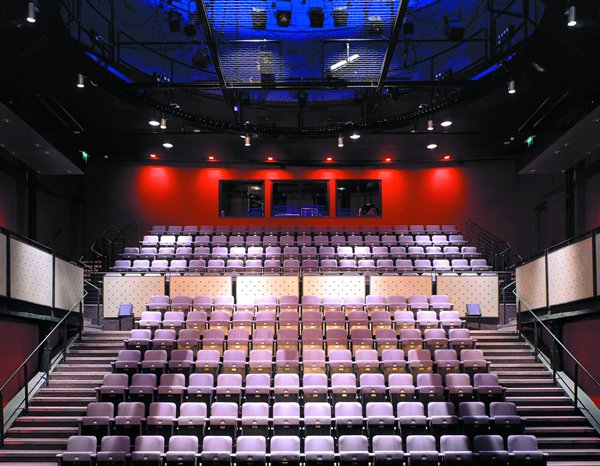The Company
Tron Theatre was established as a theatre club in 1979 (going fully public in 1989), rising from the ashes of the destroyed Close Theatre, based at the Citizens’ Theatre, Glasgow. Originally based in the Victorian Bar of the Tron church building whilst the Kirk itself was transformed into the auditorium, Tron Theatre has become a leading player in Scottish theatre. In 1984 Faynia Williams became the Tron’s first Artistic Director and, with her husband Richard Crane acting as dramaturg, wrote the first Tron Theatre Company script, Burke and Hare.
In 1986, Michael Boyd took over the reigns to begin a decade-long tenure as Artistic Director, establishing the fledgling theatre company as a powerhouse of both new writing and dynamic productions of classic texts, making full use of available Scottish talent. Leading artists to emerge from this period include Alan Cumming, Forbes Masson, Peter Mullan, Craig Ferguson and Siobhan Redmond, as well as musician Craig Armstrong (Baz Luhrmann’s Romeo and Juliet and Moulin Rouge).
Among the highlights of Michael Boyd’s tenure at the Tron were a landmark production of Macbeth (starring Iain Glen), an award-winning adaptation of Janice Galloway’s The Trick is to Keep Breathing (Glasgow, London, Toronto), the introduction of Quebec playwright Michel Tremblay to Scotland (The Guid Sisters), and a string of popular and unique Glaswegian Christmas shows.
From 1996 to 1999 the company was led by Irina Brown and productions included David Greig’s award-winning The Cosmonaut’s Last Message to the Woman He Once Loved in the Former Soviet Union, as well as a dynamic international programme.
During 2000 the Tron Theatre Company presented two world premieres of plays by Scottish writers: Our Bad Magnet by Douglas Maxwell and Further than the Furthest Thing by Zinnie Harris, a co-production between the Tron Theatre Company and the Royal National Theatre. The production premiered at the Edinburgh International Fringe Festival 2000 to universal critical acclaim, winning four major awards before a London run at the National Theatre, a subsequent transfer to the Tricycle Theatre, London and a tour of South Africa.
In 2002 Neil Murray was appointed Director of Tron Theatre, serving as Artistic Producer for the Company. Shows produced in this period include Iain Heggie’s Love Freaks, Possible Worlds by John Mighton (as the centrepiece of the Canadian Six Stages Festival), Forbes Masson’s Jack and the Beanstalk and Cinderella and Chris Hannan’s Shining Souls in a co-production with v.amp productions which was awarded Best Production in the Critics Awards for Theatre In Scotland in 2003.
Other notable productions include the world premiere of David Greig’s San Diego and Anthony Neilson’s The Wonderful World of Dissocia in 2004, this time in a collaboration with Edinburgh International Festival and the Theatre Royal, Plymouth. The production went on to win 5 out of 10 awards in the 2005 Critics’ Awards for Theatre in Scotland. The production was also revived in 2007 in conjunction with the National Theatre of Scotland, touring the UK including performances at the Royal Court Theatre, London.
Between May 2005 and May 2006 the post of Director of the Tron Theatre was held by Ali Curran, formerly of the Peacock Theatre at the Abbey Theatre in Dublin. The Tron produced three new works during this time: the premiere of Ubu the King, a co-production with Dundee Repertory Theatre, the Barbican, Old Vic and Bite:05, adapted by David Greig and directed by Dominic Hill; the European premiere of John Mighton’s latest work, Half Life, co-produced with Perth Theatre and Canadian-based Necessary Angel; the annual Christmas panto, written by Forbes Masson, Weans in the Wood; and a brilliantly innovative production of Shakespeare’s The Tempest.
Following Ali Curran, Gregory Thomson led the company between 2007 and 2008, presenting the world premiere of The Patriot by Olivier-award winning writer Grae Cleugh, an innovative production of Antigone, directed by David Levin, an adaptation of Louise Welsh’s novel Tamburlaine Must Die as part of Glasgay! in 2007 as well as the co-production with Borderline Theatre Company of D.C. Jackson’s The Wall.
Following the departure of Gregory Thomson in 2008, Andy Arnold took on the position of Artistic Director after many years as Artistic Director of The Arches. Productions Andy directed for Tron Theatre Company include The Drawer Boy by Michael Healey, the Scottish premiere of That Face by Polly Stenham, Valhalla by Paul Rudnick (UK premiere), and world premieres of Sea And Land And Sky by Abigail Docherty, Plume by J.C. Marshall and Edwin Morgan’s Dreams – And Other Nightmares by Liz Lochhead.
Other directorial work during his tenure included Enda Walsh’s Ballyturk; Martin McCormick’s Ma, Pa and the Little Mouths; Martin McDonagh’s The Lonesome West; Peter Arnott’s Shall Roger Casement Hang?; Samuel Beckett’s Happy Days, starring Karen Dunbar; as well as the first stage production of James Joyce’s Ulysses adapted by Dermot Bolger, which toured to Ireland after its premiere at the Tron. Ulysses was revived in 2015 and invited to perform in four cities in China. More recently, he directed Cyprus Avenue by David Ireland; La Performance, a co-production with the International Visual Theatre, Paris and John Byrne’s Underwood Lane in a co-production with OneRen supported by Future Paisley; and his final production for Tron Theatre Company was Nae Expectations, Gary McNair’s adaptation of the Dickens classic Great Expectations, in November 2023.
Tron Theatre is currently under the artistic leadership of Jemima Levick, who joined the organisation in April 2024.
